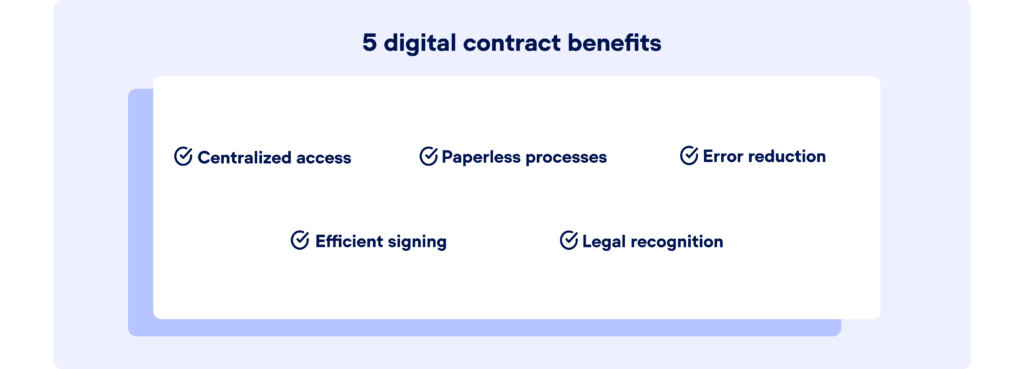Digital Contracts: What are They and How to Create and Manage Them
Digital contracts offer many advantages over traditional paper-and-ink agreements. Their legality is recognized in jurisdictions around the globe, which means they’re just as enforceable as their paper counterparts. And they’re easy to create and manage using a contract lifecycle management (CLM) system.
Let’s dive in, and see how simple it is to create and manage contracts digitally.
What is a digital contract?
A digital contract is a legally binding agreement that’s created and signed digitally. Also known as an electronic contract or e-contract, a digital contract is drafted, signed, stored, and managed entirely in an electronic format.
Digital contracts include all the following features:
- Electronic format: The entire contract exists in a digital form, eliminating the need for paper copies.
- Legally binding: Just like paper contracts, digital contracts are enforceable by law when they meet legal requirements such as offer, acceptance, and consideration.
- Electronic signatures: These replace handwritten signatures, providing a secure and fast way to seal the deal.
- Accessibility: Stored in the cloud or on secure servers, granting easy access to authorized individuals from anywhere.
- Security measures: Advanced encryption techniques protect the contract’s integrity and the confidentiality of information.
- Timestamps: Digital contracts often include time-stamping features that provide a chronology of edits and signatures.
- Interoperability: Can be integrated with other digital systems or platforms for broader business operations like invoicing or project management.
- Global reach: E-signature laws have made digital contracts legally enforceable in many jurisdictions, allowing for international dealings.
As we’ll see in the following sections, these features help make digital contracts legal, while also making them more efficient and convenient than traditional paper agreements.
Are digital contracts legal?
Most jurisdictions around the world consider digital contracts to be legally equal to paper-and-ink contracts. The Electronic Signatures in Global and National Commerce (E-SIGN) Act in the United States, the European Electronic Identification, Authentication and Trust Services (eIDAS) Regulation, and other similar laws in other countries confer legal validity on electronic contracts and e-signatures.
These laws stipulate that an e-contract is just as legally binding as an equivalent paper-based contract. In other words, a digital contract (like a paper one) is only as valid as its legal enforceability. For example, all parties must have the capacity to enter into a contract, the agreement must make a clear offer, the terms and conditions must be well-defined, and all signers need to display clear intent to sign.
Digital contract benefits
In a nutshell, the main benefits of digital contracts are:
- Centralized access: Track changes, finalize negotiations, and collect signatures remotely using smartphones or computers.
- Paperless processes: Save on paper, postage, and storage space, making contracts more eco-friendly.
- Error reduction: Simplify tracking and auditing with Contract Lifecycle Management (CLM) systems to minimize human mistakes.
- Efficient signing: Use electronic signatures to expedite the signing process.
- Legal recognition: Digital contracts are equivalent to standard paper agreements in most jurisdictions around the world.
Keeping a contract in one centralized digital location makes it easier to track changes, finalize negotiations and collect signatures within the document itself – all remotely, with any compatible smartphone or computer.
Digital contract management eliminates the need for paper, postage and storage space for paper-and-ink agreements. They also help reduce human errors, and can be easily tracked and audited within a contract lifecycle management (CLM) system.
And importantly, digital contracts allow for the use of electronic signatures, which make the signing process much more efficient. What’s more, e-signatures are recognized as legally equivalent to handwritten signatures in many jurisdictions worldwide.

How to create a digital contract
People create digital contracts in a wide variety of ways. If you’re starting with a paper contract, you can use a scanner or smartphone camera to turn it into a digital file, which you can sign digitally.
Alternatively, if you’ve got a PDF or Microsoft Word file of your contract, you can upload it into your CLM software and sign it there.
If you want real-time editing and collaboration features, your best bet is to start a new live document in a CLM tool and draft your contract from scratch or from a template – or copy-paste text from your source document into the live doc you create. This will give your entire team the ability to track changes, add comments, and edit a contract in real time, adding e-signature functionality as you go.
How to sign a contract digitally
The process of digitally signing a contract varies based on the tools and platforms you use.
Here are common methods of signing contracts digitally:
- Scan and upload: Hand-sign a paper copy of the contract, scan it, and then upload the image into your digital document.
- Pros: Familiar process
- Cons: Time-consuming and lacks security features
- Microsoft Word’s signature line: Add a signature line to a Word document, then digitally sign it.
- Pros: Comes built-in with Microsoft Office
- Cons: Slightly complicated to use and lacks advanced security features
- Online signature tools: Use online services like DocuSign or Adobe Sign to upload and digitally sign a document.
- Pros: Easy to use, secure
- Cons: Some versions may lack identity verification
- CLM platform e-signatures: Utilize built-in e-signature functionalities in CLM platforms like Concord.
- Pros: Secure, compliant, and integrates smoothly into contract management processes
- Cons: Requires a subscription to the CLM service
CLM platforms like Concord offer secure, compliant, easy-to-create electronic signatures, along with a robust set of features for editing and organizing your contracts.
How to manage digital contracts
Cloud contract management software like Concord makes it easy to draft, store, sign and track your contracts in one central location.
What’s more, a digital approach to contract management will let you automate the processes of sending contracts out for approvals and signatures, rather than sending them as email attachments. Managing contracts in the cloud will also enable you to automate deadline tracking and set reminders for contracts about to renew, ensuring tighter compliance, as well as stronger performance from each relationship.
When using a cloud-based CLM platform, keep these best practices in mind:
- Use templates: Create templates for your standard contracts. Customize these templates for each specific deal.
- Automate approvals and signatures: Use workflow automation to send out contracts for approval and signature, eliminating manual email processes.
- Set deadline reminders: Automatically track contract milestones and deadlines, sending out reminders to relevant parties.
- Conduct audits: Use your CLM’s auditing capabilities to monitor changes, accesses, and completions of contracts for compliance and review.
Digital contract examples
Digital contracts come in a wide variety of types.
Here are some of the most common types of digital contracts you’ll encounter:
- Employment contracts: Digital employment agreements outline job responsibilities, salary, benefits, and termination clauses. They’re signed digitally by both employer and employee.
- Lease agreements: Whether for an apartment or office space, lease agreements can be executed and signed electronically, detailing terms like rent, duration, and responsibilities.
- Service agreements: Businesses commonly use these to establish the terms and conditions for a provided service. Digital versions facilitate quick edits and electronic signing.
- Non-disclosure agreements (NDAs): Digital NDAs protect confidential information. Parties can quickly sign and store these electronically for easy access and tracking.
- Sales contracts: These detail the conditions under which products or services are sold. Digital formats allow for easy customization and quick closings.
- Software licenses: Often presented during software installation, these are agreed upon with a simple click.
- Vendor agreements: Detailing terms between a business and its suppliers, these digital contracts enable efficient collaboration and procurement.
To get you started in the world of digital contract creation, we’ve provided a few sample templates to try out with CLM software like Concord. You can download them below:
To use these examples to create your own contracts, just upload them into your CLM software, edit the text to reflect your organization’s details, and add your own custom fields – then share the resulting contracts within the CLM platform. That’s all there is to it!
CLM software makes it easier to track changes, finalize negotiations, collect signatures, and make documents available to remote users without having to worry about version control or attachments.




